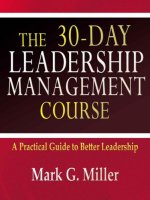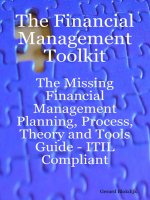The 30-Day Leadership Management Course
Bạn đang xem bản rút gọn của tài liệu. Xem và tải ngay bản đầy đủ của tài liệu tại đây (470.92 KB, 105 trang )
Introduction
Day 1-6: Strengthen Sense of Self
Day 1: Core Values
Day 2: Personal Mission Statement
Day 3: Contribution to the Company
Day 4: Personal Accountability
Day 5: The Leader as Follower
Day 6: Vulnerability in Leadership
Day 7-18: Assess Your Leadership Style
Day 7: Employees' Description of You
Day 8: Planning the Work
Day 9: Organizing the Work
Day 10: Sending a Message
Day 11: Listening for Understanding
Day 12: Supervision
Day 13: Providing Performance Feedback
Day 14: Motivation
Day 15: Problem-Solving
Day 16: Decision-Making
Day 17: Effective Meetings
Day 18: Training and Development for Employees
Day 19-26: Organizational Culture
Day 19: Effective Communication
Day 20: Commitment to Company Goals
Day 21: Understanding Priorities
Day 22: Respect in the Workplace
Day 23: Integrity in the Workplace
Day 24: Detoxifying the Environment
Day 25: Work / Life Balance
Day 26: Celebrating Success
Day 27-30: Know Your Team
Day 27: Strengths and Challenges of Individuals
Day 28: Strengths and Challenges of the Team
Day 29: Balancing the Team
Day 30: Teambuilding
Conclusion
Introduction
Spend just 15-30 minutes a day for 30 days to
improve your business leadership skills. Everyone
from your newest hire to your oldest client will
benefit if you understand who you are as a leader
and what you can expect from your employees. All
you have to do is think through the way you act in
the workplace, consider proven principles for
effective management, and be honest and realistic
with yourself about how you can change your
behavior.
Do not be concerned about whether you are a
manager or leader. Warren Bennis, a business
management guru of the last several decades, said,
'The manager does things right; the leader does the
right thing.' Successful business leaders have
discovered they really prefer a fusion of the two
concepts.
Day 1-6: Strengthen Sense of Self
In order to lead other people or manage a business,
you need a strong sense of who you are as a person
in your business setting.
Day 7-18: Assess Your Leadership Style
Everyone has a natural leadership style. Be aware
of yours so you can build on your strengths and
address your weaknesses. This is where you have
to be ruthlessly honest with yourself.
Day 19-26: Organizational Culture
As a leader or even the senior manager, you set the
tone for the business environment whether it is the
entire company or just your branch.
Day 27-30: Know Your Team
No matter what your actual business management
title, the outcome of your work is only as good as
the input of your team. You can compensate, you
can cover up, or you can even deny problems, but
you cannot sustain successful outcomes without
supporting good teamwork.
Be prepared to look at yourself, strip away any
defensiveness, and reveal your key attributes as a
successful leader. Remember, there is no right or
wrong leadership style. It is a question of
strengthening your capabilities for business
leadership in your particular situation.
Over the next 30 days you will have a number of
exercises to perform, tips to review and
"homework" that will help you to become a better
leader. These exercises are meant to reinforce
what you are reading and provide practical
applications on how to make effective change in
your leadership.
DAY 1
Strengthen Sense of Self
Core Values
Question
What do you stand for?
You reveal your personal core values every time
you act and speak. These are the beliefs on which
you base personal relationships and business
strategies. They guide you in making decisions and
in mentoring others. They describe the essence of
your character.
If you say or do something that makes you squirm
when you think about it later, you have probably
acted against your core values. If you are really
uncomfortable dealing with an employee situation,
check to see if your core values are still intact.
When you are living out your personal values, you
are comfortable and confident because your
beliefs, your motivations, and your actions are
perfectly aligned.
Take the time now to think through what is
important to you in life. There is no right or wrong
answer. It is a personal look at what really matters
to you and what motivates you when you make
decisions or interact with people.
Write down a list of values. Then, identify the 5 to
8 that are most important to you. Here are a few to
kick-start the exercise.
Love
Integrity
Respect
Achievement
Harmony
Reliability
Test the validity of your values. Think back to a
recent management decision or action. What were
the core values on which it was based?
Over the next few days, continue to analyze your
workplace decisions based on your list of core
values until you are confident that you have a better
understanding of why you behave the way you do.
You should also be comfortable in your behavior if
it is consistent with your personal values.
Learning Point
Your core values affect your day to day behavior
and effectiveness as a leader.
DAY 2
Strengthen Sense of Self
Personal Mission Statement
Question
Why do you come to work every day?
A personal mission statement articulates the
purpose of your life in the workplace. It reflects
how you use your skills, gifts, and experience, and
the reasons why you enjoy your job. This statement
also recognizes your core values.
Take a few quiet moments to answer these
questions. You might find it useful to sit
somewhere comfortable with a paper and pen
instead of your computer. This way, you can make
a more personal connection with the thoughts you
are processing. Try to list at least three answers to
each question. Do not worry about any overlap.
Why do you work in this particular job?
What does work mean to you?
What do you want from work?
The answers to these questions are really all about
you, whether you are the business owner, a senior
manager, or a front line supervisor. Now, refocus
on the company.
What is the purpose of your job?
What strengths and commitment do you bring
to the job?
Who is affected and how are they affected by
your competence and commitment?
Enlarge that picture beyond your current
workplace.
What do you want to accomplish over a
lifetime of work?
Review all your answers to the above questions
and turn them into one statement with three key
components.
One or two actions verbs on how you will use
your strengths.
A phrase or two describing your core values.
A few words about what you want to
accomplish in life.
The result is a personal mission statement that is
the framework for everything you do and say as a
leader in your business world.
Learning Point
Your management style is a reflection of your
strengths, values, and your overall purpose in life.
DAY 3
Strengthen Sense of Self
Contribution to the Company
Question
What do you contribute to the leadership of your
organization?
Your personal mission statement reflects your
skills, interests and the reason you go to work
every day. It includes recognition of your
capabilities on the job. Now, it is time to look
more closely at what you bring to the job. It is not
just listing your qualifications, but also thinking
through how you use them in the workplace in
order to achieve the company's goals.
Make a list of the following qualifications for
which you were hired.
Skills
Knowledge
Experience
Education and certifications
Beside each item on your list, add a few words
about how you use that qualification on the job.
Also list capabilities and experience that you are
not using in this particular position. For example,
you might have successful experience as a
volunteer with responsibilities different from the
workplace.
Besides your professional qualifications, you bring
to the workplace personal attributes that determine
the way in which you apply your knowledge and
skills. Make a list of characteristics such as the
ones below that help define who you are as an
organizational leader.
Reliable
Flexible and adaptable
Motivated and self-disciplined
Team player
Supportive of employees
Realistic about time and expectations
Make sure you are honest with yourself about your
attributes. Cite examples that demonstrate how you
show these characteristics. Think about how your
employees would describe you, and why in those
particular terms.
Now that you have developed a complete profile
of who you are professionally, consider this
question.
Do you believe you can contribute more to the
leadership of the company?
It might be good timing to explore opportunities for
increased or different responsibilities to make
better use of your competencies.
Learning Point
Regular reviews of your leadership contributions
are important as your experience and the needs of
the company change over time.
DAY 4
Strengthen Sense of Self
Personal Accountability
Question
Do you hold yourself accountable?
Accepting accountability means owning up to
successes and failures and accepting the
consequences. Why wait for senior management or
your clients to question your commitment to your
work? If you want to be a successful manager, hold
yourself accountable. The results will show in
improved performance, increased respect in the
workplace, and increased personal value. Personal
accountability also pays dividends in building a
culture of trust as employees realize you are not
shifting blame to them when there are problems.
You have the ability to hold yourself accountable
for the work you direct and influence, the outcomes
achieved, and the way in which you exercise your
authority. Unfortunately, there are always
situations outside your control that have a negative
impact on you and your reputation. However, you
are still accountable for the way you respond to
them.
Whether you recognize it or not, you work within a
framework that determines your accountability in
all areas of your life. Take charge of it to reduce
the chances of having someone else tell you that
you have been a success or a dismal failure in
fulfilling your responsibilities. Take time now to
review the key elements of your accountability
framework.
Goals. Make a list of your career goals and
your personal objectives. These can range
from owning your own business, to being
physically fit, or to being a great mom or dad.
Areas of responsibility. Under each goal,
write down your responsibilities in working
toward each goal. This might include
fulfilling commitments at work according to
your job description, being on time for
meetings, communicating more effective,
sticking to a budget, exercising three hours a
week, and attending most of your son's
basketball games.
Personal choices. List the ways in which you
discharge those responsibilities. This
includes showing respect for others, your
attitude toward work and employees, your
manners and basic courtesy, managing your
time, and even your spending habits.
Turn this information into an accountability
checklist. Set aside at least 15 minutes each week
to review your progress. If you are accountable
consistently in all areas of your life, it is easier to
be an effective manager.
Learning Point
Take control of your life by holding yourself
accountable in all areas.
DAY 5
Strengthen Sense of Self
The Leader as Follower
Question
As a leader, do you know how to follow?
This question might sound rather contradictory.
However, if you think about the attributes of a
good follower, you will see they are also
characteristics of a good leader. Review the
following descriptions of a follower to see if they
apply to you as a leader.
Supportive. An employee who is a good
follower listens carefully to the manager's
directions and expectations, and then supports
him in achieving the company's goals. If you
are an effective leader, you support your
employees not just in their routine work, but
also in developing their potential. This means
you listen to their goals and aspirations, and
explore career possibilities with them.
Facilitative. Followers who are engaged in
the work process know how to make things
happen. They facilitate the day-to-day work,
assisting overloaded colleagues, offering
advice when needed, or soothing an upset
new hire. As an effective manager, you also
know how to facilitate the work. You do not
simply issue orders and wait for results. You
are aware of the team dynamics; you are there
to encourage and provide guidance.
Team player. Often, the followers are taken
for granted if they are always available, do
their jobs well, and then continue to the next
task or the next client. As a leader, you might
feel you are taken for granted. If so, remember
that you have employees who do the best they
can and are not always appreciated. Do not
let them down. Listen carefully to employees,
acknowledging that there are parts of the
business they know better than you do. As an
effective leader, you also understand that
everyone benefits when you allow and even
encourage other team members to assume
leadership roles in various situations.
No matter what your title is, there is always
someone else who is in charge. Even the owner of
a successful business acknowledges that the clients
influence what he does. You are never in a
position where you cannot learn from listening to,
and following the lead of others.
Learning Point
An effective leader knows how to be a good
follower.
DAY 6
Strengthen Sense of Self
Vulnerability in Leadership
Question
Are you comfortable in your vulnerability as a
leader?
When people achieve the position of manager,
team leader or senior executive, they are often seen
as acquiring more power and influence and
shedding some of that day-to-day reporting to a
boss. The reality is that these are vulnerable
positions.
A vulnerable leader is one who is open to people,
to ideas, and to taking risks to achieve the
company's goals. Are you willing to stand exposed
to the world of your company and clients while
you plan an expansion, develop policies, or
negotiate contracts? Are you prepared to accept
both personal and organizational negative
consequences?
Personal consequences. People you respect
might ridicule you for decisions you make.
Employees might be waiting for a project to
fail as they did not believe in it in the first
place. You might be subjected to mental and
emotional turmoil as you await the results of a
risky decision you made.
Organizational consequences. There is the
possibility that a risky decision could do
serious, systemic damage to a business and its
reputation. This, in turn, could affect the long-
term sustainability of the company.
However, there are also benefits to placing
yourself in a vulnerable leadership position. You
are exposed to new ideas that can be turned into
improved ways of working and better outcomes.
You are open to establishing more intimate
working relationships with your employees and
other stakeholders. Your vulnerability is a
demonstration of commitment to achieving the
company's mission.
Can you identify business situations where you
have felt personally vulnerable? How deliberate
and cautious are you when making risky decisions
that expose you and the company to uncertain
consequences? Have you had to make ethical
decisions that have left the company in a bad
position?
Allowing and accepting vulnerability in your
leadership role is a very personal decision. Only
you know how strong and how committed you are
to achieving outcomes.
Learning Point
Make a conscious decision about the extent of your
leadership vulnerability so you are not in an
exposed position just because you are not paying
attention to the possible risks.








 pdf](https://media.store123doc.com/images/document/14/ri/ma/medium_ULM1gCf9v4.jpg)
